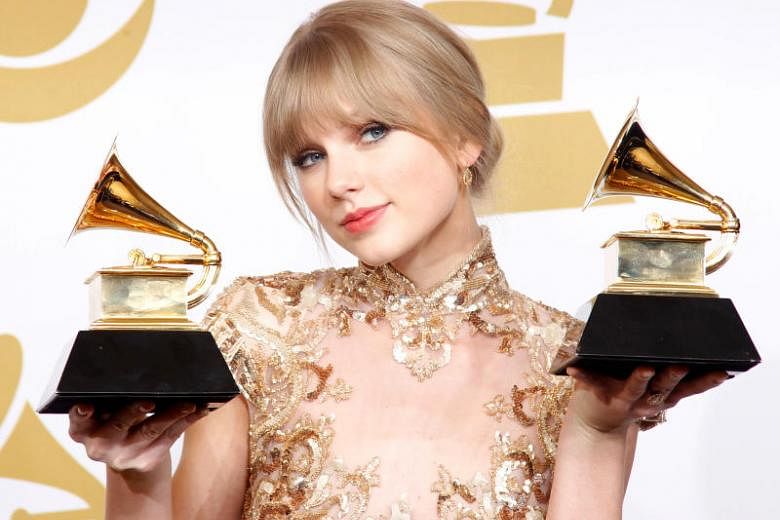When rival music acts release albums or singles on the same day, it is usually a declaration of war.
There were shots fired in the pop music world recently when Taylor Swift chose to finally release her catalogue on music streaming service Spotify at around the same time Katy Perry dropped her new album Witness.
The bad blood between the former-friends-turned-enemies has been well documented.
Perry fans were quick to cry foul - Swift had been withholding her songs from the streaming service for three years, so naturally there was renewed interest in her hits on Spotify.
If it was Swift's way of sabotaging her former friend, the strategy worked.
Early figures showed that Swift's 1989 album alone clocked over 1.68 million streams, compared with Witness' 1.1 million streams on Spotify. The latest numbers released yesterday showed that Perry won by a hair's breadth though, with both albums clocking close to 19 million streams last week.
Rivalry between artists has been around as long as the first humans hummed the first melodies and banged out the first rhythmic beats, but each decade, generation and genre boast its own royal showdowns.
Back in the 1990s, British music and alt-rock music fans relished the great Britpop chart showdown between Blur and Oasis.
In the 1980s, the rivalry between Michael Jackson and Prince meant there were many fans who chose to take sides.
The notion that you can be a fan to only one act and not both is silly of course, and very petty, but pop rivalries are a marketing strategist and clickbait headline writer's dream.
This might sound cynical, but in Perry's case, a sure-fire way to get column inches in the promotional lead-up to Witness was to trigger gossip.
Sure, she spoke about the new music on Witness in interviews, but what got more headlines were her comments about how she is ready to let her beef with Swift go, despite speculation that a song in the album, Swish Swish, was a diss track aimed at Swift.
Being in the news all the time is pretty helpful when you've got a new album to plug.
The numbers race in the pop world is a long game and a victory in battle does not equate to winning the war.
In the case of Blur and Oasis, their rivalry culminated in what was dubbed "The Battle Of Britpop" in 1995.
Both bands released their singles on the same day and Blur won the first round when their tune Country House went to No. 1 on the British charts and outsold Oasis' Roll With It by 60,000 copies.
It could be said that Oasis had the last laugh though - their subsequent singles and 1995 album (What's The Story) Morning Glory? catapulted them from British indie act to bona fide global rock stars, leaving Blur in the dust.
Sometimes the juicy chatter surfaces decades after the rivalry has been long forgotten.
Details about how much The King of Pop, who died in 2009, and Prince, who died last year, detested each other came out only in recent times.
Two months after Prince's death, British tabloid The Mirror revealed Jackson's "secretly recorded rants about Prince", in which the former calls the latter "one of the rudest people I have ever met" and described him as "mean" and "nasty".
Pop rivalry isn't all bad - it can lead to the creation of great music.
British music rag NME has observed how the Blur vs Oasis saga "reinvigorated the UK music scene and defined an era".
And though they weren't exactly enemies, The Beatles and The Beach Boys, two giants from the 1960s, were engaged in a game of one-upmanship that resulted in some of rock 'n' roll music's finest albums.
Beach Boys frontman and songwriter Brian Wilson was so jealous of The Beatles' ground-breaking 1965 album Rubber Soul that it prompted him to create his band's magnum opus, Pet Sounds, released the following year.
The Beatles then answered with the legendary 1967 album Sgt. Pepper's Lonely Hearts Club Band, which Paul McCartney described as "an attempt to equal Pet Sounds".
The passing of time heals many rifts, even the seemingly irreconcilable ones.
The recent album by Blur frontman Damon Albarn's other prominent band, Gorillaz, featured the most unlikely collaborator - Oasis main man Noel Gallagher himself.
The former bitter enemies - Gallagher once wished Aids on Albarn - have even performed together live.
Like they sing in their collaboration song We Got The Power, an unabashed anthem for hope: "We got the power to be loving each other/No matter what happens, we've got the power to do that."


